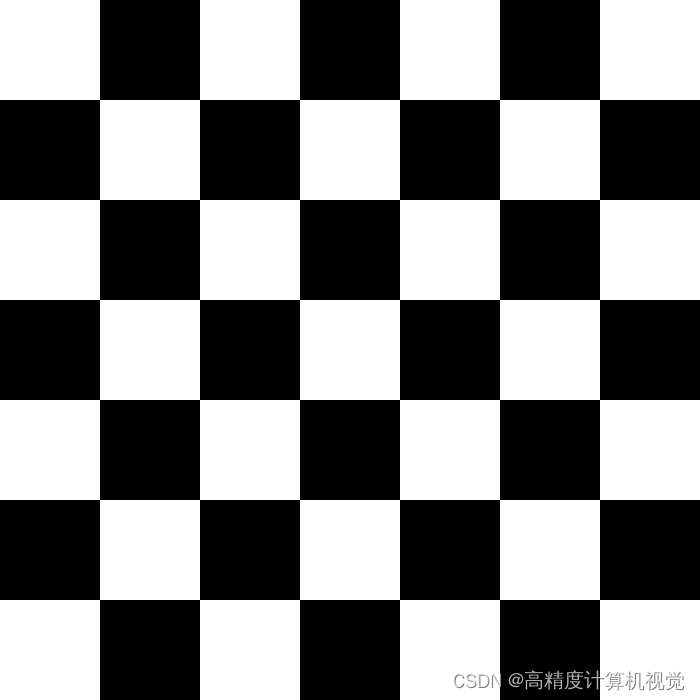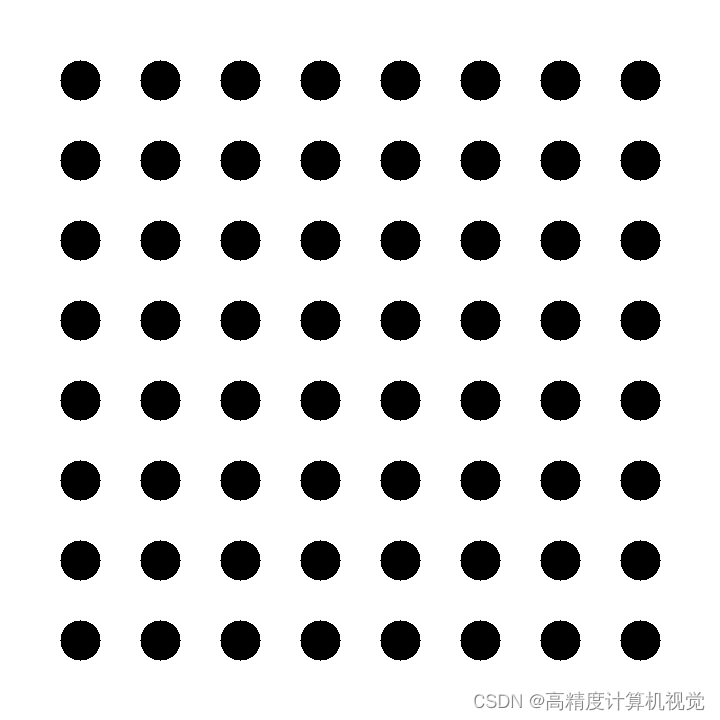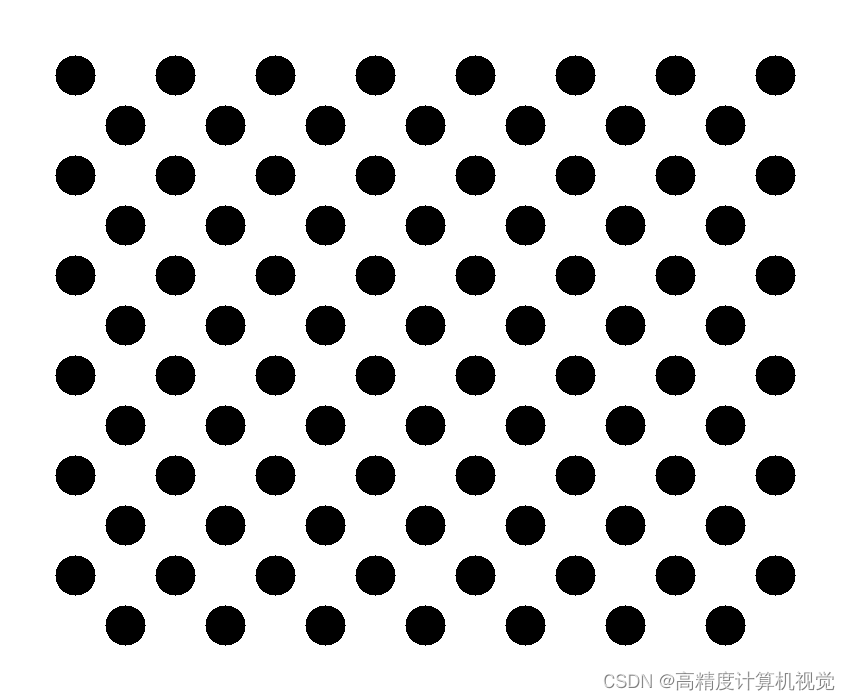OpenCV标定演示,及如何生成标定板图片
标定的程序在官方的源码里有,
opencv-4.5.5\samples\cpp\tutorial_code\calib3d\camera_calibration
很多小白不知道怎么跑起来,这个也怪OpenCV官方,工作没做完善,其实的default.xml是要自己手动改的,输入的图片也要自己去拍摄,还有那个VID5.xml也要改成可以直接找到图片的路径;
我这里拍了5张图,故意做了鱼眼效果后,用于标定校正。程序已经改好了,直接visual studio就可以跑了,到这里去下载吧,
https://github.com/SpaceView/OpenCV455_cameraCalibrationDemo
关于标定板:
OpenCV官方曾经提供的标定板是CHESSBOARD 9x6和7x7的,实际应用根据场景的需要,可能需要不同的标定板。
标定程序实际支持三种标定板,包括chessboard,grid circle, asymmetric grid circle格子,这里我们手动生成标定板(包括这里提到的三种标定板)的图片, 程序如下,
class CalibTools {
public:
cv::Mat GenerateChessboard(int xBlockNum, int yBlockNum, int BLOCKWIDTH, std::string saveFileName) {
//const int BLOCKWIDTH = 150;
//const int xBlockNum = 7;
//const int YBlockNum = 7;
cv::Size sz = { xBlockNum * BLOCKWIDTH, yBlockNum * BLOCKWIDTH };
cv::Mat mat(sz, CV_8UC3);
for (int r = 0; r < yBlockNum; r++) {
for (int c = 0; c < xBlockNum; c++) {
int IX = c * BLOCKWIDTH, IY = r * BLOCKWIDTH;
int EX = IX + BLOCKWIDTH, EY = IY + BLOCKWIDTH;
cv::Vec3b value;
if (0 == (c + r) % 2) {
value = { 0xFF,0xFF, 0xFF };
}
else {
value = 0x000000;
}
for (int y = IY; y < EY; y++) {
cv::Vec3b* p = mat.ptr(y);
for (int x = IX; x < EX; x++) {
p[x] = value;
}
}
}
}
if (!saveFileName.empty()) {
saveFileName += ".png";
cv::imwrite(saveFileName, mat);
}
return mat;
}
/*
* * * * * * * * --> xDotNum1 = 7 _|_ 1
* * * * * * * * _|_ 2
* * * * * * * * _|_ 3
* * * * * * * * _|_ 4
* * * * * * * * _|_ 5
* * * * * * * * _|_ 6
* * * * * * * * _|_ 7 --> In total yDotNum = 7
*/
cv::Mat GenerateGridCircle(int xDotNum, int yDotNum, int dotRadius, int BLOCKWIDTH, std::string saveFileName) {
cv::Size sz = { (xDotNum +1) * BLOCKWIDTH, (yDotNum+1) * BLOCKWIDTH };
cv::Mat mat(sz, CV_8UC3);
mat.setTo(cv::Scalar(255,255,255));
for (int r = 1; r <= yDotNum; r++) {
int y = r * BLOCKWIDTH;
for (int c = 1; c <= xDotNum; c++) {
int x = c * BLOCKWIDTH;
cv::circle(mat, cv::Point(x, y), dotRadius, cv::Scalar(0, 0, 0), cv::FILLED);
}
}
if (!saveFileName.empty()) {
saveFileName += ".png";
cv::imwrite(saveFileName, mat);
}
return mat;
}
/*
* * * * * * * * --> xDotNum1 = 7 |
* * * * * * * --> xDotNum2 = 6 _|_ 1, --> 2 rows make 1 unit in yDotNum
* * * * * * * * |
* * * * * * * _|_ 2
* * * * * * * * |
* * * * * * * _|_ 3
* * * * * * * * |
* * * * * * * _|_ 4, --> In total yDotNum = 4
*
* *<--->* ---> DOTDIST
* *
* * *
*/
cv::Mat GenerateAsymmetricGridCircle(int xDotNum1, int xDotNum2, int yDotNum, int dotRadius, int DOTDIST, std::string saveFileName) {
int totXDotNum = xDotNum1 + xDotNum2 + 2;
int totYDotNum = 2 * yDotNum + 2;
int DIST = DOTDIST / 2;
int HDIST = DIST / 2;
cv::Size sz = { totXDotNum * DIST, totYDotNum * DIST };
cv::Mat mat(sz, CV_8UC3);
mat.setTo(cv::Scalar(255, 255, 255));
for (int r = 1; r < totYDotNum-1; r++) {
for (int c = 1; c < totXDotNum-1; c++) {
int IX = c * DIST, IY = r * DIST;
int CX = IX + HDIST, CY = IY + HDIST;
if (0 == (c + r) % 2) {
cv::circle(mat, cv::Point(CX, CY), dotRadius, cv::Scalar(0, 0, 0), cv::FILLED);
}
}
}
if (!saveFileName.empty()) {
saveFileName += ".png";
cv::imwrite(saveFileName, mat);
}
return mat;
}
}; 调用方式举例如下,
CalibTools ct;
ct.GenerateChessboard(7, 7, 100, "GenerateChessboard");
ct.GenerateGridCircle(8, 8, 20, 80, "GeneratedGridCircles");
ct.GenerateAsymmetricGridCircle(8, 7, 6, 20, 100, "GenerateAsymmetricGridCircle");这样,就可以生成下列形状的标定板,
然后打印出来就可以做标定板了。
关于非对称的圆形标定板,可以参考下面的贴子,
OpenCv相机标定——圆形标定板标定_opencv圆形标定板-CSDN博客
本文结束。


